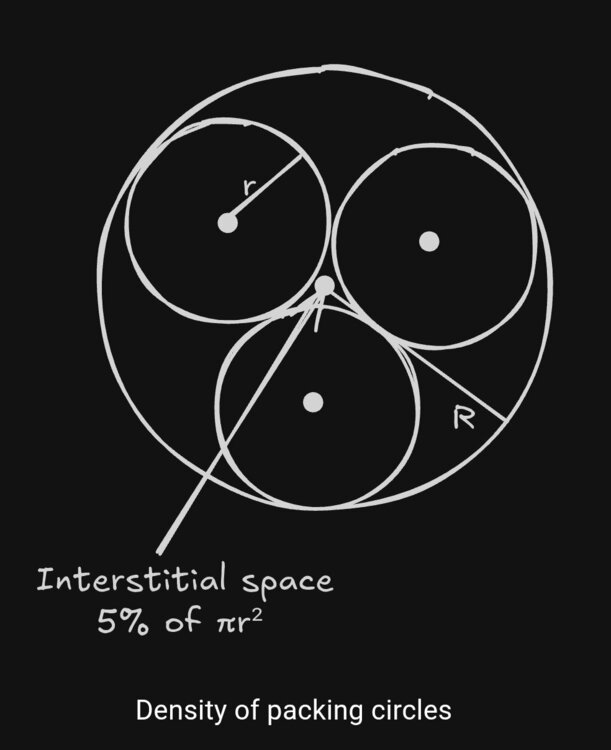-
Thalamic Nuclei Oserved Driving Conscious Perception
That's very plausible, though the only thing that keeps me a bit skeptical is the olfactory part. Based on my limited understanding, one definite takeaway is that the thalamus seems deeply involved in maintaining the coherence of conscious experience. It's likely, what they would say, the conductor behind the illusion of unity and continuity of subjective experience.
-
Thalamic Nuclei Oserved Driving Conscious Perception
From what I’ve read so far, it seems like you guys are quite convinced that the thalamus is the primary source of consciousness, not just a contributing part. That’s what I meant by the phrase "centre of consciousness" (figuratively). It also seems like the terms "central role" and "centre of consciousness" are being used interchangeably here, even though they convey very different ideas.
-
DavidWahl started following Limit of the packing density of identical circles: and Consciousness In Brain Function
-
Thalamic Nuclei Oserved Driving Conscious Perception
@TheVat is right. I see that the usage of the word in this case can be easily misleading if you misinterpret the context. I'm pretty sure the word "central" simply means critical or key here. This shouldn't be confused as it being the "centre of consciousness". The article doesn't explicitly state that the thalamus is the centre.
-
New religion of Nothingness
What will I be rewarded with by devoting my life to Nothingness? Will my life come to nothing?
-
Is there anyone of same age or age group as me?
I see. Anyways, thank you for sharing this. This is soulful and achingly poetic, enough to make a grown man cry. Now I'm sad.
-
Is there anyone of same age or age group as me?
That's like watching the child you raised grow up and die. Do think there's any chance that a chunk of those manuals are still lying somewhere? If I were you, I would've retrieved anything that was left of them and kept it to myself as souvenir...
-
Is there anyone of same age or age group as me?
Wow, you're an all rounder, I see. I can barely manage to keep up with one interest. That must've been painful to witness...
-
Is there anyone of same age or age group as me?
Yes. Do you happened to be kvian? I was a kvian. It's baffling to see that you're already engaged in advanced ideas at such a young age.
-
Is there anyone of same age or age group as me?
Yes, sorry. I vaguely remembered your name when you introduced yourself.
-
Is there anyone of same age or age group as me?
Hi Kulraj I'm 20 years old. It's refreshing to see someone from my country that share similar interests.
-
Would it make sense to forcibly cure psychopaths if the tools were available?
I agree that once actual harm has occurred, it makes sense for traits like ASPD to be considered in sentencing or parole. But I’m still troubled by the question: What do we do when someone shows deeply concerning signs before any actual harm is done? There was a recent case of a teenage boy who created horrifying, disturbing drawings fantasising about murder and later went on to actually murder someone. His father noticed the signs prior to the event but didn’t act likely out of fear of overreacting. Was it right for society to wait? As @studiot also suggested, this issue is far more complex and nuanced than it may first appear. It runs deeper into society. It's not as simple as saying, 'Act only after harm is done,' or 'Don't criminalize traits.' We're dealing with difficult questions now about how to respond to warning signs that don’t yet qualify as crimes but may indicate serious risk. I'm not in favor of pre-crime punishment either but I believe we should at least have a preventive system that allows for early support or intervention when someone shows credible signs of dangerous intent. That way we could protect others without criminalizing mental illness. This is the grey area I believe we need to take seriously.
-
Would it make sense to forcibly cure psychopaths if the tools were available?
But there's a serious ethical dilemma here. Do we wait for violence to occur before we act even when we strongly suspect it’s coming? If we always wait until someone is harmed, we risk failing the victims who could've been saved, the damage is irreversible. Let's say there weren't any clear and early warning signs like killing the neighbor's dog, then who gets to decide what counts as a threat? How do we go about resolving this without crossing into the line of punishing someone for having a mental illness?
-
Limit of the packing density of identical circles:
This is a good way to show that the dots do cover up the entire circle but what I dislike about this method is that it doesn't say much about the arrangement, it simply ignores it. Depending on the 2D-arrangement we choose, the packing density can change. Besides, I'm not sure that it's safe to assume an array of infinitesimally small circles to be approximately equivalent to a line. What about those gaps?
-
Limit of the packing density of identical circles:
Does someone know this? While I was making a small study on circle packing recently, I came across this problem that left me scratching my brains. I found this problem interesting and wanted to share. It goes something like this: Q) We want to reduce the size of circles and as we do so, fill them up into a different and bigger circle as much as possible (maximum). As the radius of the small circles approaches to zero and fills up the mother circle, 1.Does the packing density approaches to 1 (filling up the entire mother circle)? OR 2.Does the packing density approaches to that of the hexagonal lattice arrangement (i.e. 0.906...) and therefore not filling up the entire mother circle? (For those who don't know, packing density is the ratio of the area covered by the circles to the total area of the space they are packed into. It's a measure of how much space is covered by the circles compared to the total space available.) If you know calculus, in this case, the small circles will behave as infinitesimals and at first, it might seem obvious that the small circles must fill up the entire mother circle. But, if you observe carefully, circle as infinitesimals do not behave like traditional infinitesimals (rectangles) where as the breadth of the rectangle shortens, the gap between the infinitesimals and the curve decreases therefore covering up the entire area under the curve. Whereas in the case of circles, the size of the gaps (interstitial space) remains as significant as the circles themselves making up 5% of the area of the small circle. Therefore, as the size of the circles decreases, both the gaps and the circles equally compete for space. But I'm not really sure if this is still the case when the circles theoretically become point-like. It could be possible that the limiting packing density could be something else entirely.
-
About Consciousness
This is something I have come to understand from my own experience; although, specifically in this matter, we don’t have to witness success to know what it demands. I believe we already have all the important information we need. The most valuable benefactor of science will be the one who can fit all the pieces of the puzzle together harmoniously.


